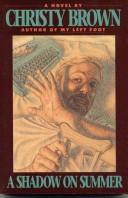Riley McCombe, a crippled Irish novelist, is on his first visit to the United States, guest of his British publisher's old friends, Laurie and Don Emerson. He is there to celebrate the American publication of his first novel, but more important, to complete in the peace and quiet of a small Connecticut seaside town, his second book. For that task, Laurie becomes his guide and mentor. This peace is disturbed by the young freelance photographer, Abbie Lang, hired by Riley's American publishers to take photographs at their celebration party. To Riley she is something exciting and exotic; and Abbie falls in love. She takes him on a sight-seeing tour of New York, marvelously described, and then to her Greenwich Village studio where fruitlessly they spend the night together. For in the developing drama that emerges it becomes clear that though Abbie and Laurie both, in the their different ways, love him, Riley is incapable of response. He is a prisoner of his own ego, a man struggling at all costs for self-fulfillment through his writing, torture though his struggle may be. So he casts a shadow on the lives of both these mutually antagonistic women during the long New England summer. At the end, his book is finished, but will he ever write another? Abbie has been cast aside, but in a finely written chapter Laurie endeavors to give him hope. There may yet be a summer without shadows. In the end it must be up to him.
